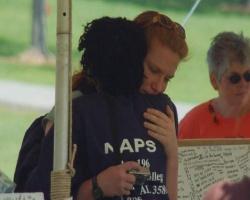What makes a real pastor? Veteran youth ministry worker, Jennifer Bradbury, responds to a student’s challenge about her title, position and educational background.
It was the end of our regular Sunday Morning Program. After finishing what felt like a great day of teaching – of engaging students in God’s word and helping them to encounter Christ in new ways – I launched into our ministry’s upcoming announcements.
At the time, we were knee deep in confirmation and so I began reminding students of our confirmation requirements & their due dates.
That’s when one of my students blurted out, “Who are you to make us do all of this stuff, anyway? It’s not like you’re a real pastor.”
Ouch.
Though I did my best to ignore the remark, inside I was devastated.
As soon as the program concluded, I fled to my car, where I quickly dissolved into tears, wondering why something that a 14 year old said could have angered, discouraged, and hurt me so much. For the rest of the day, as the phrase “real pastor” reverberated around my head, taunting me, I began questioning, “Just what does it mean to be a real pastor in the first place?”
On the one hand, I know that I’m not a real pastor. I have no piece of paper that confers such a title to me or validates what I do. I have no seminary degree, and no certificate of ordination. Right now, I don’t even have an office. What I do have is a Bachelors of Science Degree from the University of Illinois in Electrical Engineering and a calling from God so powerful that it caused me to disregard that degree & go into professional youth ministry immediately after graduating.
By definition, I’m not a real pastor. Yet, in my heart, I believe that I am because to me, here’s what a real pastor is.
Real pastors are those individuals whom God has called to serve His church and are willing to do so despite the personal sacrifices, the low pay, and the constant sources of discouragement and frustration.
Real pastors are those who know their true worth and value comes from God. Real pastors know that no amount of education, or lack thereof, will make God love them more or less than he already does. Nor will any job title or salary. Instead, real pastors are secure in their identity in Christ.
Real pastors are leaders. Leaders are people whom others follow – not because of a title given to them, but rather because of the way they motivate, inspire, and challenge people.
Real pastors are those who equip and train others to serve and glorify God. Real pastors know that it takes a team working together to effectively do ministry and so real pastors value their teams. Knowing how fulfilling it is to serve God, real pastors also try to ignite that desire in others.
Real pastors shepherd others, just as Jesus shepherded his disciples. This means that real pastors genuinely care about people, not because of what a person can do for their ministry, but rather because they’re a human being loved by God. Real pastors also consistently challenge others to grow in their faith.
Real pastors know how to really listen to what people are saying, as well as to what they’re not saying. Real pastors are those who are more concerned with hearing what others have to say than with being heard themselves.
Real pastors embrace doubts and questions – both their own, as well as those that come from the people to whom they minister. Doubts and questions don’t scare real pastors, who instead use them to propel themselves and others deeper into their journey of faith, constantly causing them to explore and reexamine their own faith, while remaining open to new ideas. Real pastors consider this faith journey to be the ultimate adventure.
Real pastors are encouragers who see beyond a person’s facade and into their hearts and potential. Real pastors speak God’s words of truth into the lives of others, encouraging people to become who God created them to be. Real pastors encourage the dreams of others & dare to dream themselves.
Real pastors are human. They accept that they’re NOT God and so they don’t try to be. By embracing their own brokenness, they allow God to use them to minister to other broken people.
Broken people like Sarah, the student who initially caused me to contemplate the meaning of a “real pastor” in the first place. Sarah is, without a doubt, challenging. In particular, I remember a mission trip that Sarah attended, and, for no particular reason, she destroyed several people’s air mattresses, including my own. In response, I confronted her and in that moment, God gave me the ability to love her, listen to her, and show her his grace, a response that was simply met with tears. Since then, I have continued to love Sarah no matter how often she’s pushed me away, and to see past her facade to the person God has created her to be. I’ve spoken words of truth into her life, encouraged her, and believed in her.
So the next time Sarah tells me that I’m not a “real pastor,” I truly believe I’ll be able to look her in the eye and respond humbly and confidently that for her, I am.




